Legal Aspects of Business: Business Structures and Duties
VerifiedAdded on 2020/01/07
|11
|4037
|163
Report
AI Summary
This report delves into the legal aspects of business, examining various business structures prevalent in the UK, including sole trader, unlimited partnership, and limited liability partnership (LLP). It analyzes the advantages and disadvantages of each structure, focusing on liability, tax implications, and decision-making processes. The report also explores the duties of company directors, as defined by UK law, including acting within powers, promoting company success, and exercising reasonable care and skill. It highlights the importance of these duties for maintaining ethical conduct and legal compliance, referencing relevant sections of the Companies Act 2006. The analysis incorporates insights from various academic sources to provide a comprehensive understanding of the legal landscape for businesses in the UK.
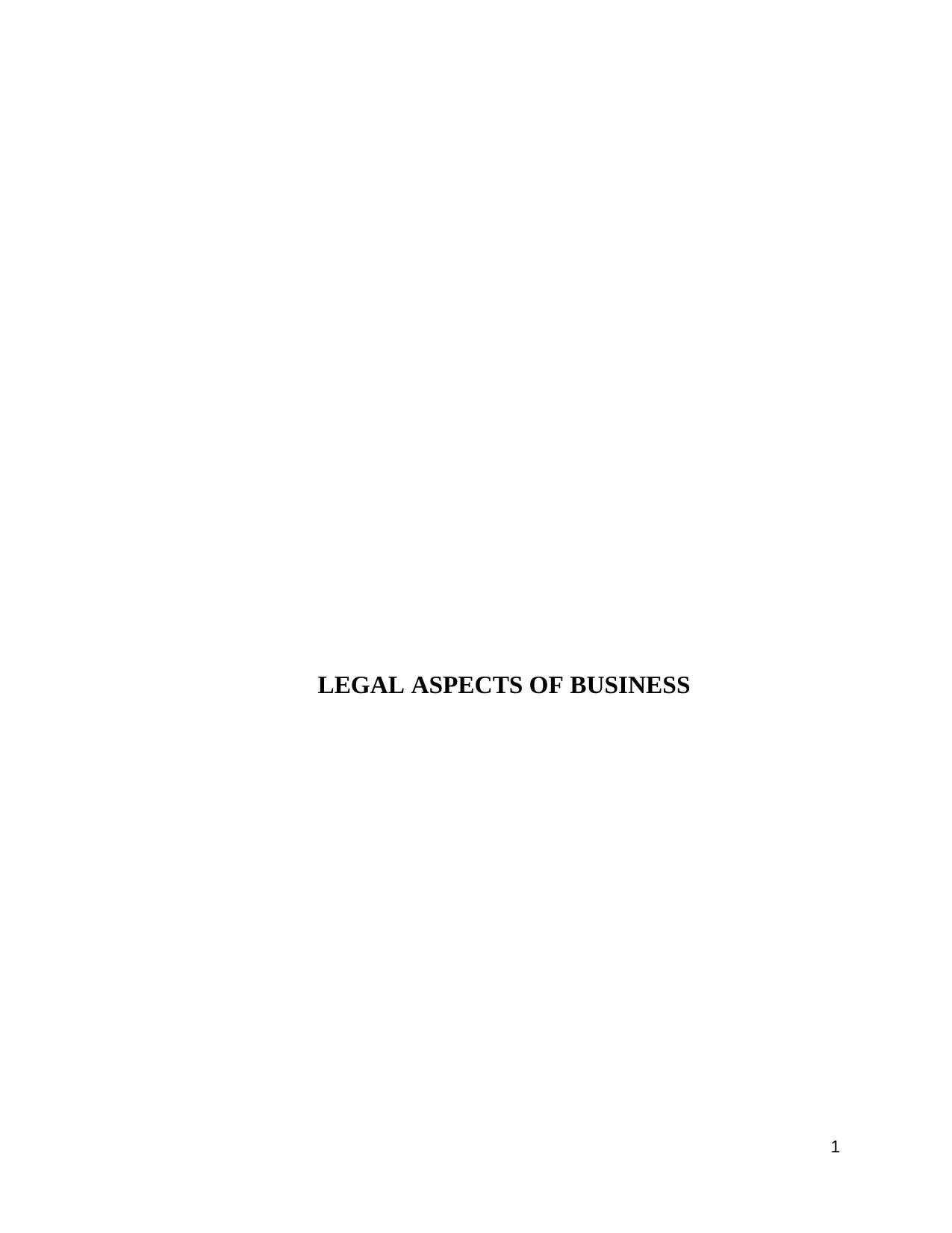
LEGAL ASPECTS OF BUSINESS
1
1
Paraphrase This Document
Need a fresh take? Get an instant paraphrase of this document with our AI Paraphraser
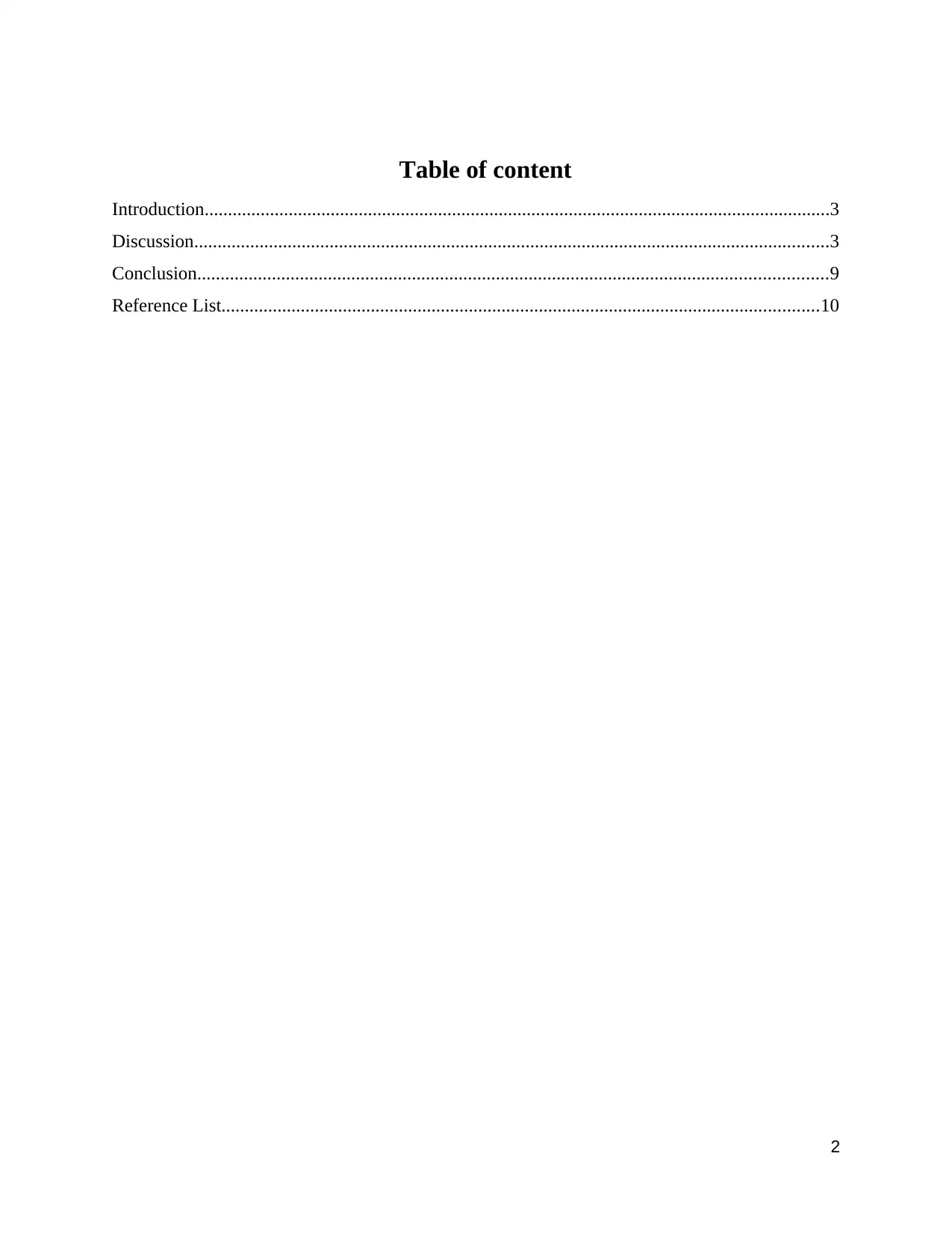
Table of content
Introduction......................................................................................................................................3
Discussion........................................................................................................................................3
Conclusion.......................................................................................................................................9
Reference List................................................................................................................................10
2
Introduction......................................................................................................................................3
Discussion........................................................................................................................................3
Conclusion.......................................................................................................................................9
Reference List................................................................................................................................10
2
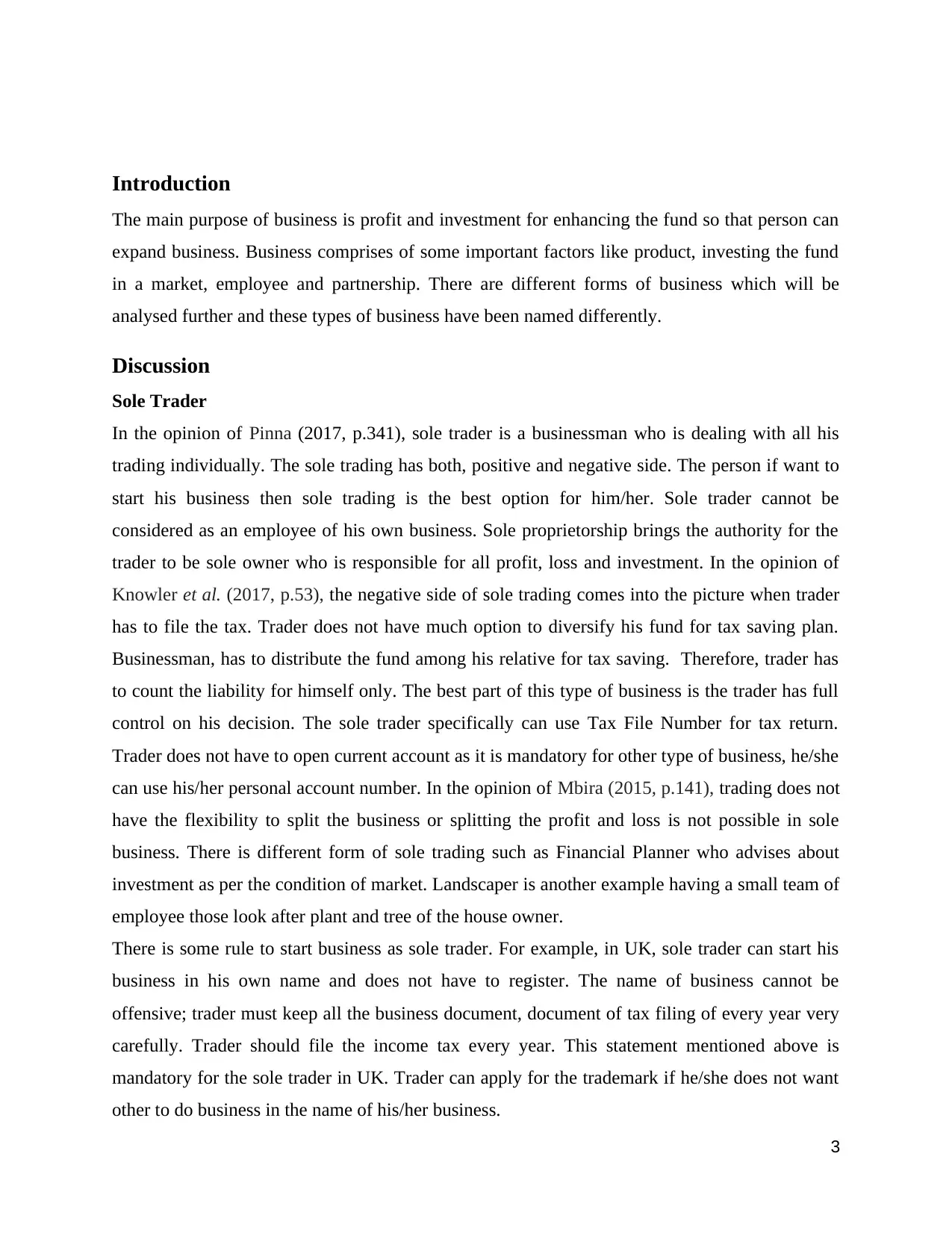
Introduction
The main purpose of business is profit and investment for enhancing the fund so that person can
expand business. Business comprises of some important factors like product, investing the fund
in a market, employee and partnership. There are different forms of business which will be
analysed further and these types of business have been named differently.
Discussion
Sole Trader
In the opinion of Pinna (2017, p.341), sole trader is a businessman who is dealing with all his
trading individually. The sole trading has both, positive and negative side. The person if want to
start his business then sole trading is the best option for him/her. Sole trader cannot be
considered as an employee of his own business. Sole proprietorship brings the authority for the
trader to be sole owner who is responsible for all profit, loss and investment. In the opinion of
Knowler et al. (2017, p.53), the negative side of sole trading comes into the picture when trader
has to file the tax. Trader does not have much option to diversify his fund for tax saving plan.
Businessman, has to distribute the fund among his relative for tax saving. Therefore, trader has
to count the liability for himself only. The best part of this type of business is the trader has full
control on his decision. The sole trader specifically can use Tax File Number for tax return.
Trader does not have to open current account as it is mandatory for other type of business, he/she
can use his/her personal account number. In the opinion of Mbira (2015, p.141), trading does not
have the flexibility to split the business or splitting the profit and loss is not possible in sole
business. There is different form of sole trading such as Financial Planner who advises about
investment as per the condition of market. Landscaper is another example having a small team of
employee those look after plant and tree of the house owner.
There is some rule to start business as sole trader. For example, in UK, sole trader can start his
business in his own name and does not have to register. The name of business cannot be
offensive; trader must keep all the business document, document of tax filing of every year very
carefully. Trader should file the income tax every year. This statement mentioned above is
mandatory for the sole trader in UK. Trader can apply for the trademark if he/she does not want
other to do business in the name of his/her business.
3
The main purpose of business is profit and investment for enhancing the fund so that person can
expand business. Business comprises of some important factors like product, investing the fund
in a market, employee and partnership. There are different forms of business which will be
analysed further and these types of business have been named differently.
Discussion
Sole Trader
In the opinion of Pinna (2017, p.341), sole trader is a businessman who is dealing with all his
trading individually. The sole trading has both, positive and negative side. The person if want to
start his business then sole trading is the best option for him/her. Sole trader cannot be
considered as an employee of his own business. Sole proprietorship brings the authority for the
trader to be sole owner who is responsible for all profit, loss and investment. In the opinion of
Knowler et al. (2017, p.53), the negative side of sole trading comes into the picture when trader
has to file the tax. Trader does not have much option to diversify his fund for tax saving plan.
Businessman, has to distribute the fund among his relative for tax saving. Therefore, trader has
to count the liability for himself only. The best part of this type of business is the trader has full
control on his decision. The sole trader specifically can use Tax File Number for tax return.
Trader does not have to open current account as it is mandatory for other type of business, he/she
can use his/her personal account number. In the opinion of Mbira (2015, p.141), trading does not
have the flexibility to split the business or splitting the profit and loss is not possible in sole
business. There is different form of sole trading such as Financial Planner who advises about
investment as per the condition of market. Landscaper is another example having a small team of
employee those look after plant and tree of the house owner.
There is some rule to start business as sole trader. For example, in UK, sole trader can start his
business in his own name and does not have to register. The name of business cannot be
offensive; trader must keep all the business document, document of tax filing of every year very
carefully. Trader should file the income tax every year. This statement mentioned above is
mandatory for the sole trader in UK. Trader can apply for the trademark if he/she does not want
other to do business in the name of his/her business.
3
⊘ This is a preview!⊘
Do you want full access?
Subscribe today to unlock all pages.

Trusted by 1+ million students worldwide
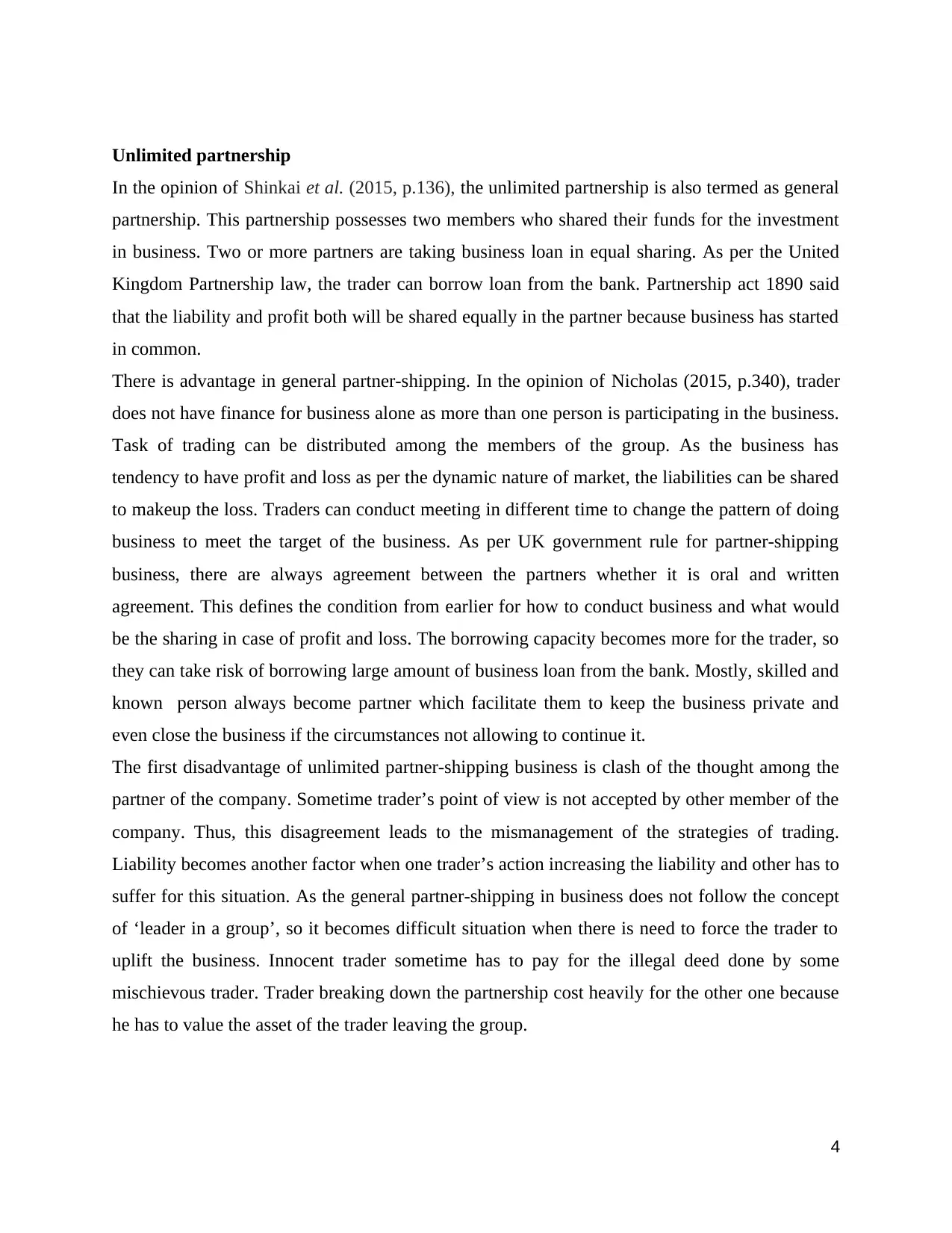
Unlimited partnership
In the opinion of Shinkai et al. (2015, p.136), the unlimited partnership is also termed as general
partnership. This partnership possesses two members who shared their funds for the investment
in business. Two or more partners are taking business loan in equal sharing. As per the United
Kingdom Partnership law, the trader can borrow loan from the bank. Partnership act 1890 said
that the liability and profit both will be shared equally in the partner because business has started
in common.
There is advantage in general partner-shipping. In the opinion of Nicholas (2015, p.340), trader
does not have finance for business alone as more than one person is participating in the business.
Task of trading can be distributed among the members of the group. As the business has
tendency to have profit and loss as per the dynamic nature of market, the liabilities can be shared
to makeup the loss. Traders can conduct meeting in different time to change the pattern of doing
business to meet the target of the business. As per UK government rule for partner-shipping
business, there are always agreement between the partners whether it is oral and written
agreement. This defines the condition from earlier for how to conduct business and what would
be the sharing in case of profit and loss. The borrowing capacity becomes more for the trader, so
they can take risk of borrowing large amount of business loan from the bank. Mostly, skilled and
known person always become partner which facilitate them to keep the business private and
even close the business if the circumstances not allowing to continue it.
The first disadvantage of unlimited partner-shipping business is clash of the thought among the
partner of the company. Sometime trader’s point of view is not accepted by other member of the
company. Thus, this disagreement leads to the mismanagement of the strategies of trading.
Liability becomes another factor when one trader’s action increasing the liability and other has to
suffer for this situation. As the general partner-shipping in business does not follow the concept
of ‘leader in a group’, so it becomes difficult situation when there is need to force the trader to
uplift the business. Innocent trader sometime has to pay for the illegal deed done by some
mischievous trader. Trader breaking down the partnership cost heavily for the other one because
he has to value the asset of the trader leaving the group.
4
In the opinion of Shinkai et al. (2015, p.136), the unlimited partnership is also termed as general
partnership. This partnership possesses two members who shared their funds for the investment
in business. Two or more partners are taking business loan in equal sharing. As per the United
Kingdom Partnership law, the trader can borrow loan from the bank. Partnership act 1890 said
that the liability and profit both will be shared equally in the partner because business has started
in common.
There is advantage in general partner-shipping. In the opinion of Nicholas (2015, p.340), trader
does not have finance for business alone as more than one person is participating in the business.
Task of trading can be distributed among the members of the group. As the business has
tendency to have profit and loss as per the dynamic nature of market, the liabilities can be shared
to makeup the loss. Traders can conduct meeting in different time to change the pattern of doing
business to meet the target of the business. As per UK government rule for partner-shipping
business, there are always agreement between the partners whether it is oral and written
agreement. This defines the condition from earlier for how to conduct business and what would
be the sharing in case of profit and loss. The borrowing capacity becomes more for the trader, so
they can take risk of borrowing large amount of business loan from the bank. Mostly, skilled and
known person always become partner which facilitate them to keep the business private and
even close the business if the circumstances not allowing to continue it.
The first disadvantage of unlimited partner-shipping business is clash of the thought among the
partner of the company. Sometime trader’s point of view is not accepted by other member of the
company. Thus, this disagreement leads to the mismanagement of the strategies of trading.
Liability becomes another factor when one trader’s action increasing the liability and other has to
suffer for this situation. As the general partner-shipping in business does not follow the concept
of ‘leader in a group’, so it becomes difficult situation when there is need to force the trader to
uplift the business. Innocent trader sometime has to pay for the illegal deed done by some
mischievous trader. Trader breaking down the partnership cost heavily for the other one because
he has to value the asset of the trader leaving the group.
4
Paraphrase This Document
Need a fresh take? Get an instant paraphrase of this document with our AI Paraphraser
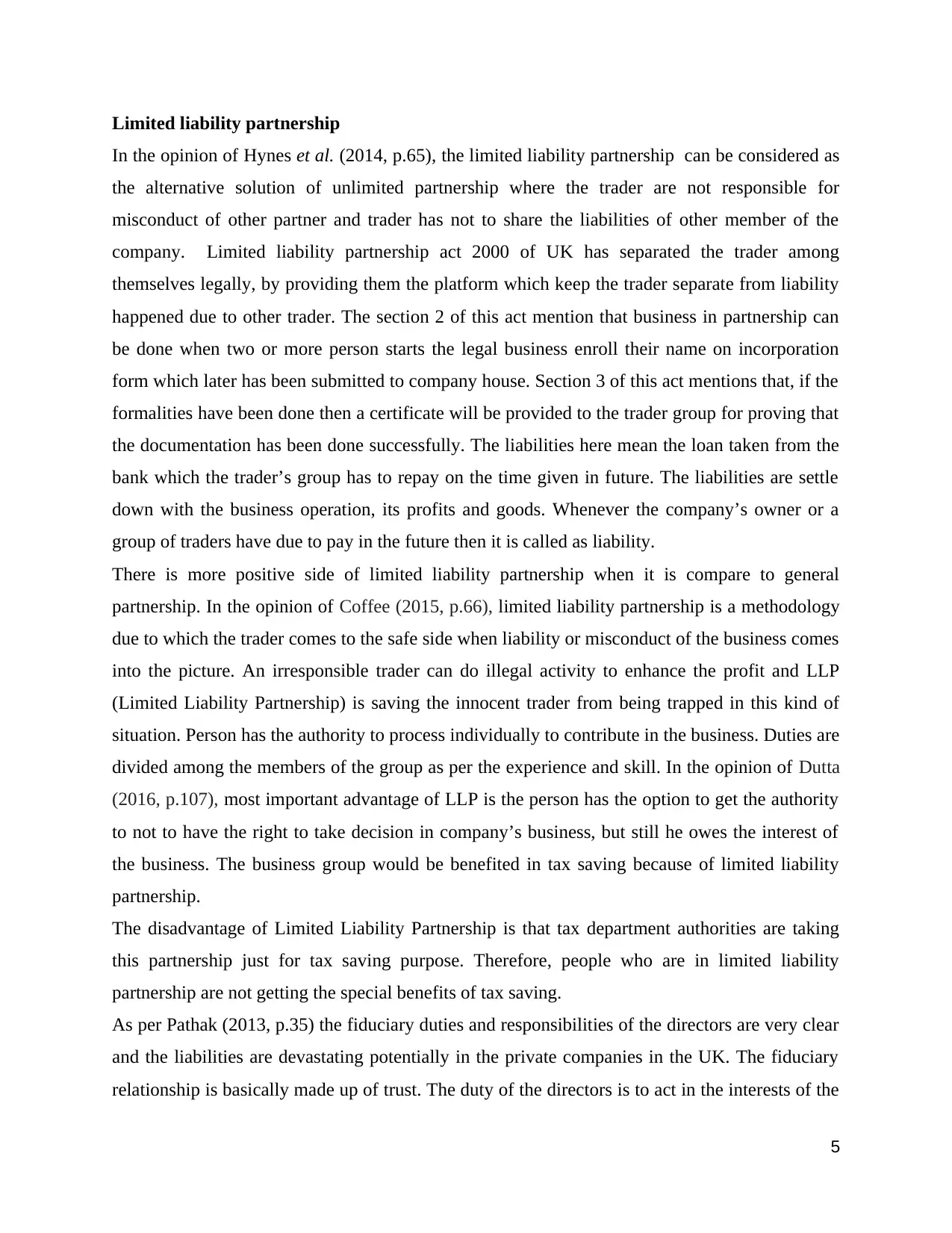
Limited liability partnership
In the opinion of Hynes et al. (2014, p.65), the limited liability partnership can be considered as
the alternative solution of unlimited partnership where the trader are not responsible for
misconduct of other partner and trader has not to share the liabilities of other member of the
company. Limited liability partnership act 2000 of UK has separated the trader among
themselves legally, by providing them the platform which keep the trader separate from liability
happened due to other trader. The section 2 of this act mention that business in partnership can
be done when two or more person starts the legal business enroll their name on incorporation
form which later has been submitted to company house. Section 3 of this act mentions that, if the
formalities have been done then a certificate will be provided to the trader group for proving that
the documentation has been done successfully. The liabilities here mean the loan taken from the
bank which the trader’s group has to repay on the time given in future. The liabilities are settle
down with the business operation, its profits and goods. Whenever the company’s owner or a
group of traders have due to pay in the future then it is called as liability.
There is more positive side of limited liability partnership when it is compare to general
partnership. In the opinion of Coffee (2015, p.66), limited liability partnership is a methodology
due to which the trader comes to the safe side when liability or misconduct of the business comes
into the picture. An irresponsible trader can do illegal activity to enhance the profit and LLP
(Limited Liability Partnership) is saving the innocent trader from being trapped in this kind of
situation. Person has the authority to process individually to contribute in the business. Duties are
divided among the members of the group as per the experience and skill. In the opinion of Dutta
(2016, p.107), most important advantage of LLP is the person has the option to get the authority
to not to have the right to take decision in company’s business, but still he owes the interest of
the business. The business group would be benefited in tax saving because of limited liability
partnership.
The disadvantage of Limited Liability Partnership is that tax department authorities are taking
this partnership just for tax saving purpose. Therefore, people who are in limited liability
partnership are not getting the special benefits of tax saving.
As per Pathak (2013, p.35) the fiduciary duties and responsibilities of the directors are very clear
and the liabilities are devastating potentially in the private companies in the UK. The fiduciary
relationship is basically made up of trust. The duty of the directors is to act in the interests of the
5
In the opinion of Hynes et al. (2014, p.65), the limited liability partnership can be considered as
the alternative solution of unlimited partnership where the trader are not responsible for
misconduct of other partner and trader has not to share the liabilities of other member of the
company. Limited liability partnership act 2000 of UK has separated the trader among
themselves legally, by providing them the platform which keep the trader separate from liability
happened due to other trader. The section 2 of this act mention that business in partnership can
be done when two or more person starts the legal business enroll their name on incorporation
form which later has been submitted to company house. Section 3 of this act mentions that, if the
formalities have been done then a certificate will be provided to the trader group for proving that
the documentation has been done successfully. The liabilities here mean the loan taken from the
bank which the trader’s group has to repay on the time given in future. The liabilities are settle
down with the business operation, its profits and goods. Whenever the company’s owner or a
group of traders have due to pay in the future then it is called as liability.
There is more positive side of limited liability partnership when it is compare to general
partnership. In the opinion of Coffee (2015, p.66), limited liability partnership is a methodology
due to which the trader comes to the safe side when liability or misconduct of the business comes
into the picture. An irresponsible trader can do illegal activity to enhance the profit and LLP
(Limited Liability Partnership) is saving the innocent trader from being trapped in this kind of
situation. Person has the authority to process individually to contribute in the business. Duties are
divided among the members of the group as per the experience and skill. In the opinion of Dutta
(2016, p.107), most important advantage of LLP is the person has the option to get the authority
to not to have the right to take decision in company’s business, but still he owes the interest of
the business. The business group would be benefited in tax saving because of limited liability
partnership.
The disadvantage of Limited Liability Partnership is that tax department authorities are taking
this partnership just for tax saving purpose. Therefore, people who are in limited liability
partnership are not getting the special benefits of tax saving.
As per Pathak (2013, p.35) the fiduciary duties and responsibilities of the directors are very clear
and the liabilities are devastating potentially in the private companies in the UK. The fiduciary
relationship is basically made up of trust. The duty of the directors is to act in the interests of the
5
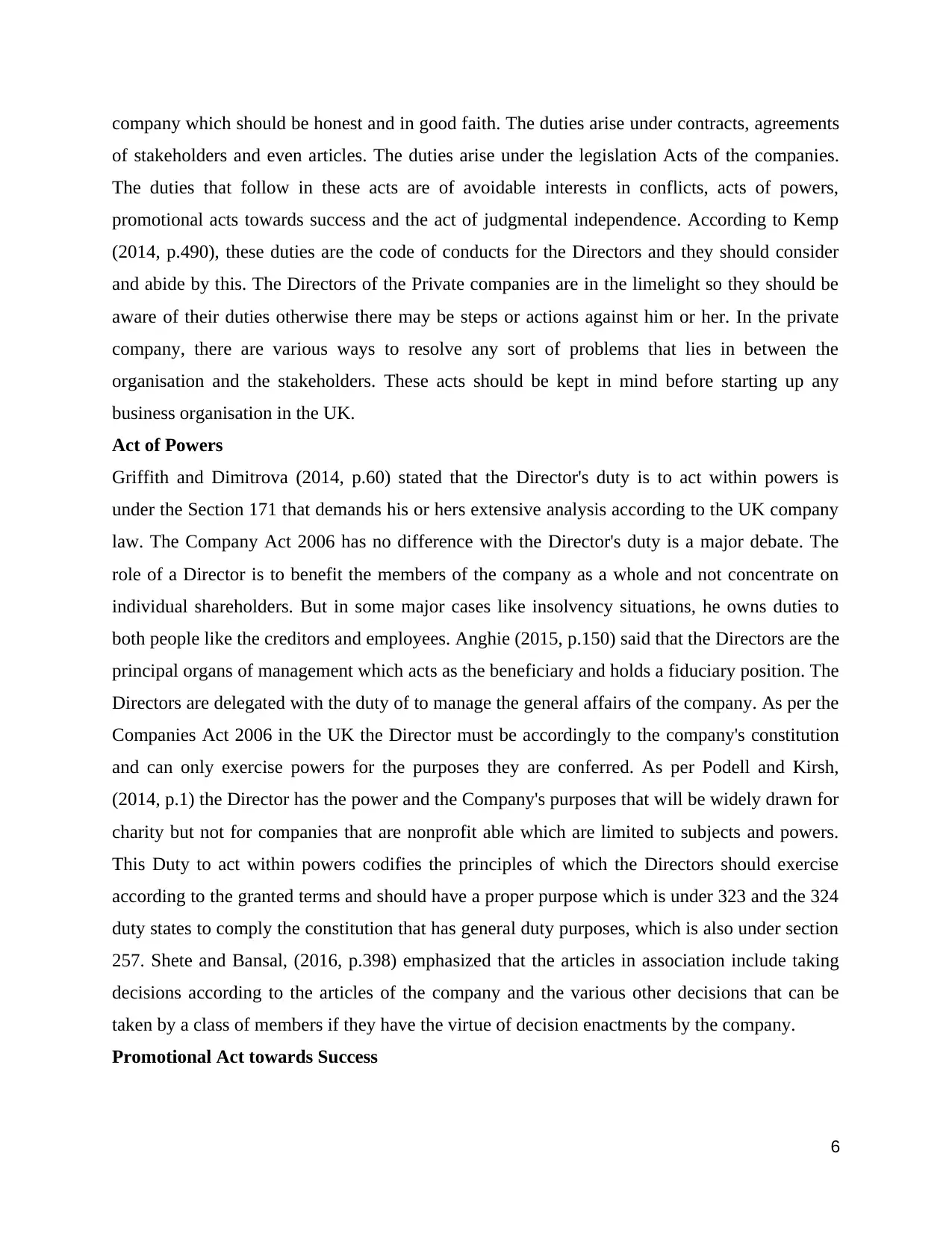
company which should be honest and in good faith. The duties arise under contracts, agreements
of stakeholders and even articles. The duties arise under the legislation Acts of the companies.
The duties that follow in these acts are of avoidable interests in conflicts, acts of powers,
promotional acts towards success and the act of judgmental independence. According to Kemp
(2014, p.490), these duties are the code of conducts for the Directors and they should consider
and abide by this. The Directors of the Private companies are in the limelight so they should be
aware of their duties otherwise there may be steps or actions against him or her. In the private
company, there are various ways to resolve any sort of problems that lies in between the
organisation and the stakeholders. These acts should be kept in mind before starting up any
business organisation in the UK.
Act of Powers
Griffith and Dimitrova (2014, p.60) stated that the Director's duty is to act within powers is
under the Section 171 that demands his or hers extensive analysis according to the UK company
law. The Company Act 2006 has no difference with the Director's duty is a major debate. The
role of a Director is to benefit the members of the company as a whole and not concentrate on
individual shareholders. But in some major cases like insolvency situations, he owns duties to
both people like the creditors and employees. Anghie (2015, p.150) said that the Directors are the
principal organs of management which acts as the beneficiary and holds a fiduciary position. The
Directors are delegated with the duty of to manage the general affairs of the company. As per the
Companies Act 2006 in the UK the Director must be accordingly to the company's constitution
and can only exercise powers for the purposes they are conferred. As per Podell and Kirsh,
(2014, p.1) the Director has the power and the Company's purposes that will be widely drawn for
charity but not for companies that are nonprofit able which are limited to subjects and powers.
This Duty to act within powers codifies the principles of which the Directors should exercise
according to the granted terms and should have a proper purpose which is under 323 and the 324
duty states to comply the constitution that has general duty purposes, which is also under section
257. Shete and Bansal, (2016, p.398) emphasized that the articles in association include taking
decisions according to the articles of the company and the various other decisions that can be
taken by a class of members if they have the virtue of decision enactments by the company.
Promotional Act towards Success
6
of stakeholders and even articles. The duties arise under the legislation Acts of the companies.
The duties that follow in these acts are of avoidable interests in conflicts, acts of powers,
promotional acts towards success and the act of judgmental independence. According to Kemp
(2014, p.490), these duties are the code of conducts for the Directors and they should consider
and abide by this. The Directors of the Private companies are in the limelight so they should be
aware of their duties otherwise there may be steps or actions against him or her. In the private
company, there are various ways to resolve any sort of problems that lies in between the
organisation and the stakeholders. These acts should be kept in mind before starting up any
business organisation in the UK.
Act of Powers
Griffith and Dimitrova (2014, p.60) stated that the Director's duty is to act within powers is
under the Section 171 that demands his or hers extensive analysis according to the UK company
law. The Company Act 2006 has no difference with the Director's duty is a major debate. The
role of a Director is to benefit the members of the company as a whole and not concentrate on
individual shareholders. But in some major cases like insolvency situations, he owns duties to
both people like the creditors and employees. Anghie (2015, p.150) said that the Directors are the
principal organs of management which acts as the beneficiary and holds a fiduciary position. The
Directors are delegated with the duty of to manage the general affairs of the company. As per the
Companies Act 2006 in the UK the Director must be accordingly to the company's constitution
and can only exercise powers for the purposes they are conferred. As per Podell and Kirsh,
(2014, p.1) the Director has the power and the Company's purposes that will be widely drawn for
charity but not for companies that are nonprofit able which are limited to subjects and powers.
This Duty to act within powers codifies the principles of which the Directors should exercise
according to the granted terms and should have a proper purpose which is under 323 and the 324
duty states to comply the constitution that has general duty purposes, which is also under section
257. Shete and Bansal, (2016, p.398) emphasized that the articles in association include taking
decisions according to the articles of the company and the various other decisions that can be
taken by a class of members if they have the virtue of decision enactments by the company.
Promotional Act towards Success
6
⊘ This is a preview!⊘
Do you want full access?
Subscribe today to unlock all pages.

Trusted by 1+ million students worldwide
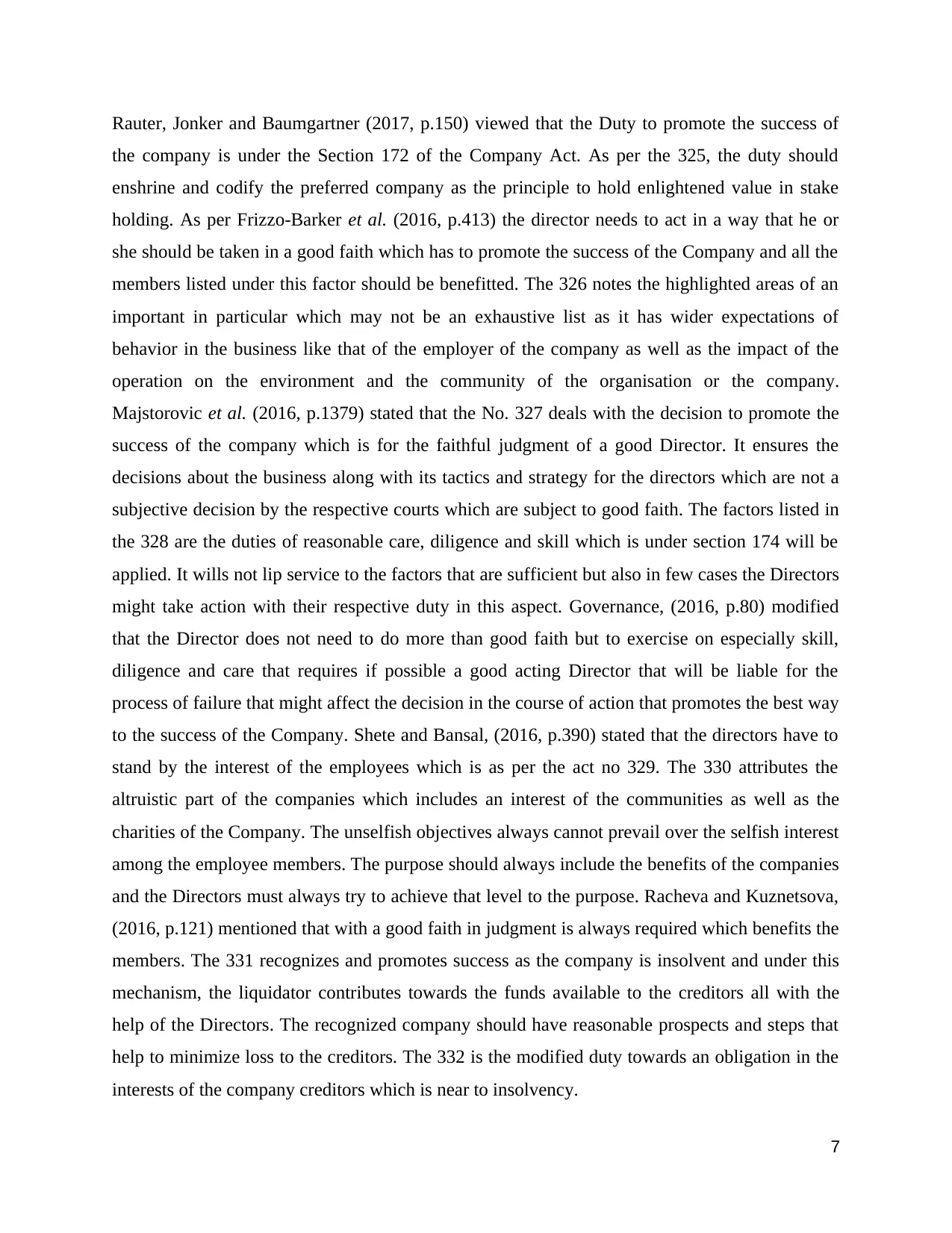
Rauter, Jonker and Baumgartner (2017, p.150) viewed that the Duty to promote the success of
the company is under the Section 172 of the Company Act. As per the 325, the duty should
enshrine and codify the preferred company as the principle to hold enlightened value in stake
holding. As per Frizzo-Barker et al. (2016, p.413) the director needs to act in a way that he or
she should be taken in a good faith which has to promote the success of the Company and all the
members listed under this factor should be benefitted. The 326 notes the highlighted areas of an
important in particular which may not be an exhaustive list as it has wider expectations of
behavior in the business like that of the employer of the company as well as the impact of the
operation on the environment and the community of the organisation or the company.
Majstorovic et al. (2016, p.1379) stated that the No. 327 deals with the decision to promote the
success of the company which is for the faithful judgment of a good Director. It ensures the
decisions about the business along with its tactics and strategy for the directors which are not a
subjective decision by the respective courts which are subject to good faith. The factors listed in
the 328 are the duties of reasonable care, diligence and skill which is under section 174 will be
applied. It wills not lip service to the factors that are sufficient but also in few cases the Directors
might take action with their respective duty in this aspect. Governance, (2016, p.80) modified
that the Director does not need to do more than good faith but to exercise on especially skill,
diligence and care that requires if possible a good acting Director that will be liable for the
process of failure that might affect the decision in the course of action that promotes the best way
to the success of the Company. Shete and Bansal, (2016, p.390) stated that the directors have to
stand by the interest of the employees which is as per the act no 329. The 330 attributes the
altruistic part of the companies which includes an interest of the communities as well as the
charities of the Company. The unselfish objectives always cannot prevail over the selfish interest
among the employee members. The purpose should always include the benefits of the companies
and the Directors must always try to achieve that level to the purpose. Racheva and Kuznetsova,
(2016, p.121) mentioned that with a good faith in judgment is always required which benefits the
members. The 331 recognizes and promotes success as the company is insolvent and under this
mechanism, the liquidator contributes towards the funds available to the creditors all with the
help of the Directors. The recognized company should have reasonable prospects and steps that
help to minimize loss to the creditors. The 332 is the modified duty towards an obligation in the
interests of the company creditors which is near to insolvency.
7
the company is under the Section 172 of the Company Act. As per the 325, the duty should
enshrine and codify the preferred company as the principle to hold enlightened value in stake
holding. As per Frizzo-Barker et al. (2016, p.413) the director needs to act in a way that he or
she should be taken in a good faith which has to promote the success of the Company and all the
members listed under this factor should be benefitted. The 326 notes the highlighted areas of an
important in particular which may not be an exhaustive list as it has wider expectations of
behavior in the business like that of the employer of the company as well as the impact of the
operation on the environment and the community of the organisation or the company.
Majstorovic et al. (2016, p.1379) stated that the No. 327 deals with the decision to promote the
success of the company which is for the faithful judgment of a good Director. It ensures the
decisions about the business along with its tactics and strategy for the directors which are not a
subjective decision by the respective courts which are subject to good faith. The factors listed in
the 328 are the duties of reasonable care, diligence and skill which is under section 174 will be
applied. It wills not lip service to the factors that are sufficient but also in few cases the Directors
might take action with their respective duty in this aspect. Governance, (2016, p.80) modified
that the Director does not need to do more than good faith but to exercise on especially skill,
diligence and care that requires if possible a good acting Director that will be liable for the
process of failure that might affect the decision in the course of action that promotes the best way
to the success of the Company. Shete and Bansal, (2016, p.390) stated that the directors have to
stand by the interest of the employees which is as per the act no 329. The 330 attributes the
altruistic part of the companies which includes an interest of the communities as well as the
charities of the Company. The unselfish objectives always cannot prevail over the selfish interest
among the employee members. The purpose should always include the benefits of the companies
and the Directors must always try to achieve that level to the purpose. Racheva and Kuznetsova,
(2016, p.121) mentioned that with a good faith in judgment is always required which benefits the
members. The 331 recognizes and promotes success as the company is insolvent and under this
mechanism, the liquidator contributes towards the funds available to the creditors all with the
help of the Directors. The recognized company should have reasonable prospects and steps that
help to minimize loss to the creditors. The 332 is the modified duty towards an obligation in the
interests of the company creditors which is near to insolvency.
7
Paraphrase This Document
Need a fresh take? Get an instant paraphrase of this document with our AI Paraphraser
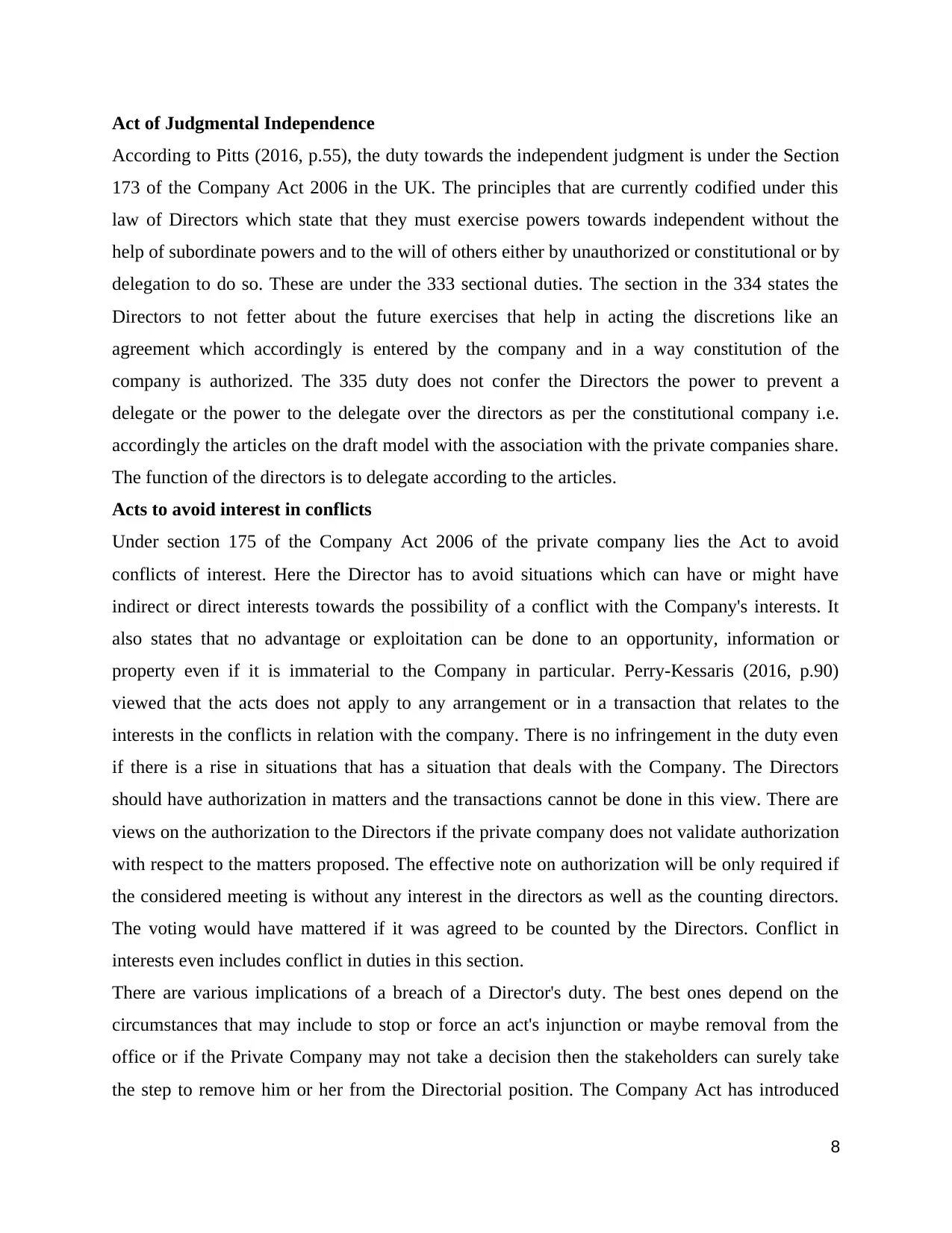
Act of Judgmental Independence
According to Pitts (2016, p.55), the duty towards the independent judgment is under the Section
173 of the Company Act 2006 in the UK. The principles that are currently codified under this
law of Directors which state that they must exercise powers towards independent without the
help of subordinate powers and to the will of others either by unauthorized or constitutional or by
delegation to do so. These are under the 333 sectional duties. The section in the 334 states the
Directors to not fetter about the future exercises that help in acting the discretions like an
agreement which accordingly is entered by the company and in a way constitution of the
company is authorized. The 335 duty does not confer the Directors the power to prevent a
delegate or the power to the delegate over the directors as per the constitutional company i.e.
accordingly the articles on the draft model with the association with the private companies share.
The function of the directors is to delegate according to the articles.
Acts to avoid interest in conflicts
Under section 175 of the Company Act 2006 of the private company lies the Act to avoid
conflicts of interest. Here the Director has to avoid situations which can have or might have
indirect or direct interests towards the possibility of a conflict with the Company's interests. It
also states that no advantage or exploitation can be done to an opportunity, information or
property even if it is immaterial to the Company in particular. Perry-Kessaris (2016, p.90)
viewed that the acts does not apply to any arrangement or in a transaction that relates to the
interests in the conflicts in relation with the company. There is no infringement in the duty even
if there is a rise in situations that has a situation that deals with the Company. The Directors
should have authorization in matters and the transactions cannot be done in this view. There are
views on the authorization to the Directors if the private company does not validate authorization
with respect to the matters proposed. The effective note on authorization will be only required if
the considered meeting is without any interest in the directors as well as the counting directors.
The voting would have mattered if it was agreed to be counted by the Directors. Conflict in
interests even includes conflict in duties in this section.
There are various implications of a breach of a Director's duty. The best ones depend on the
circumstances that may include to stop or force an act's injunction or maybe removal from the
office or if the Private Company may not take a decision then the stakeholders can surely take
the step to remove him or her from the Directorial position. The Company Act has introduced
8
According to Pitts (2016, p.55), the duty towards the independent judgment is under the Section
173 of the Company Act 2006 in the UK. The principles that are currently codified under this
law of Directors which state that they must exercise powers towards independent without the
help of subordinate powers and to the will of others either by unauthorized or constitutional or by
delegation to do so. These are under the 333 sectional duties. The section in the 334 states the
Directors to not fetter about the future exercises that help in acting the discretions like an
agreement which accordingly is entered by the company and in a way constitution of the
company is authorized. The 335 duty does not confer the Directors the power to prevent a
delegate or the power to the delegate over the directors as per the constitutional company i.e.
accordingly the articles on the draft model with the association with the private companies share.
The function of the directors is to delegate according to the articles.
Acts to avoid interest in conflicts
Under section 175 of the Company Act 2006 of the private company lies the Act to avoid
conflicts of interest. Here the Director has to avoid situations which can have or might have
indirect or direct interests towards the possibility of a conflict with the Company's interests. It
also states that no advantage or exploitation can be done to an opportunity, information or
property even if it is immaterial to the Company in particular. Perry-Kessaris (2016, p.90)
viewed that the acts does not apply to any arrangement or in a transaction that relates to the
interests in the conflicts in relation with the company. There is no infringement in the duty even
if there is a rise in situations that has a situation that deals with the Company. The Directors
should have authorization in matters and the transactions cannot be done in this view. There are
views on the authorization to the Directors if the private company does not validate authorization
with respect to the matters proposed. The effective note on authorization will be only required if
the considered meeting is without any interest in the directors as well as the counting directors.
The voting would have mattered if it was agreed to be counted by the Directors. Conflict in
interests even includes conflict in duties in this section.
There are various implications of a breach of a Director's duty. The best ones depend on the
circumstances that may include to stop or force an act's injunction or maybe removal from the
office or if the Private Company may not take a decision then the stakeholders can surely take
the step to remove him or her from the Directorial position. The Company Act has introduced
8
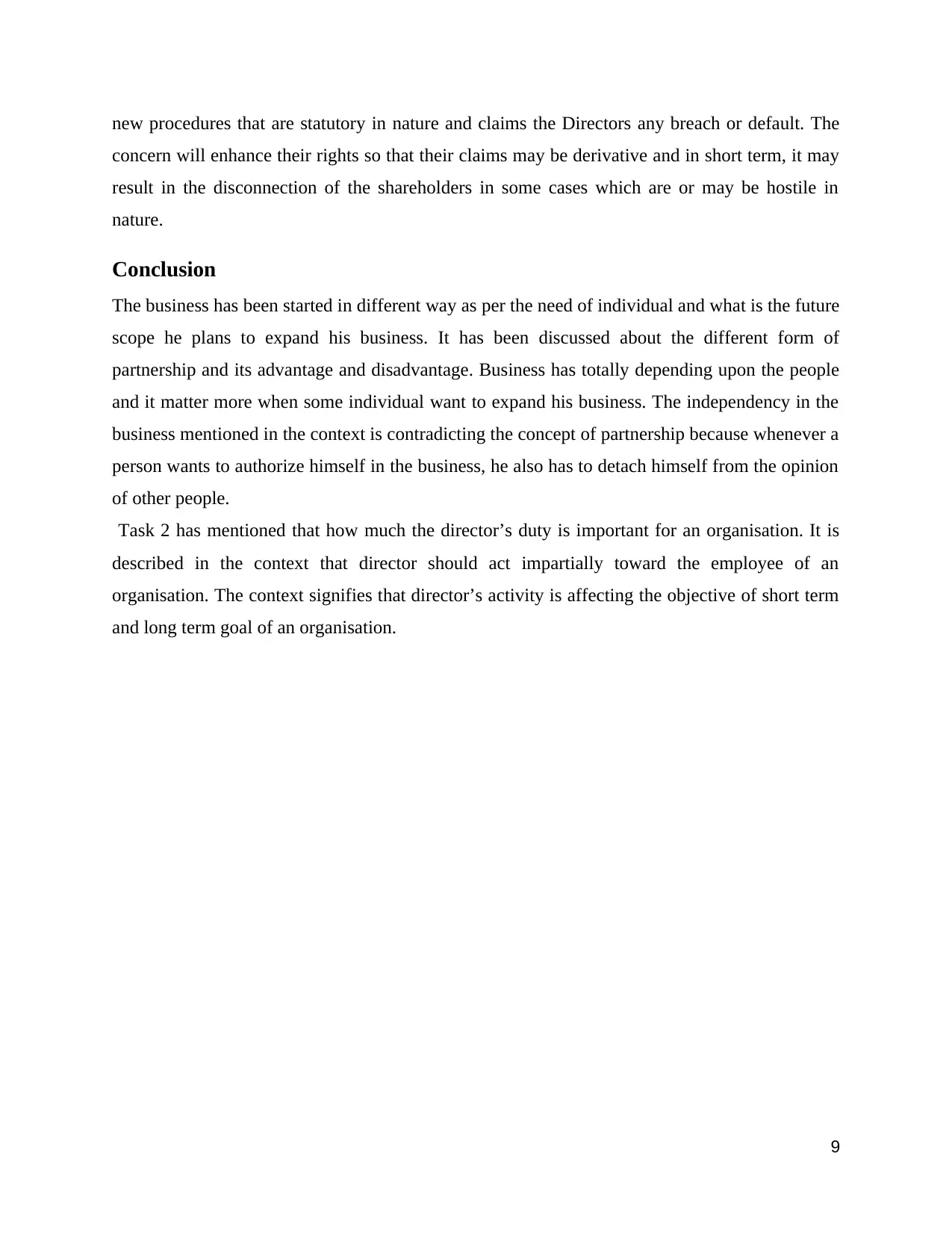
new procedures that are statutory in nature and claims the Directors any breach or default. The
concern will enhance their rights so that their claims may be derivative and in short term, it may
result in the disconnection of the shareholders in some cases which are or may be hostile in
nature.
Conclusion
The business has been started in different way as per the need of individual and what is the future
scope he plans to expand his business. It has been discussed about the different form of
partnership and its advantage and disadvantage. Business has totally depending upon the people
and it matter more when some individual want to expand his business. The independency in the
business mentioned in the context is contradicting the concept of partnership because whenever a
person wants to authorize himself in the business, he also has to detach himself from the opinion
of other people.
Task 2 has mentioned that how much the director’s duty is important for an organisation. It is
described in the context that director should act impartially toward the employee of an
organisation. The context signifies that director’s activity is affecting the objective of short term
and long term goal of an organisation.
9
concern will enhance their rights so that their claims may be derivative and in short term, it may
result in the disconnection of the shareholders in some cases which are or may be hostile in
nature.
Conclusion
The business has been started in different way as per the need of individual and what is the future
scope he plans to expand his business. It has been discussed about the different form of
partnership and its advantage and disadvantage. Business has totally depending upon the people
and it matter more when some individual want to expand his business. The independency in the
business mentioned in the context is contradicting the concept of partnership because whenever a
person wants to authorize himself in the business, he also has to detach himself from the opinion
of other people.
Task 2 has mentioned that how much the director’s duty is important for an organisation. It is
described in the context that director should act impartially toward the employee of an
organisation. The context signifies that director’s activity is affecting the objective of short term
and long term goal of an organisation.
9
⊘ This is a preview!⊘
Do you want full access?
Subscribe today to unlock all pages.

Trusted by 1+ million students worldwide
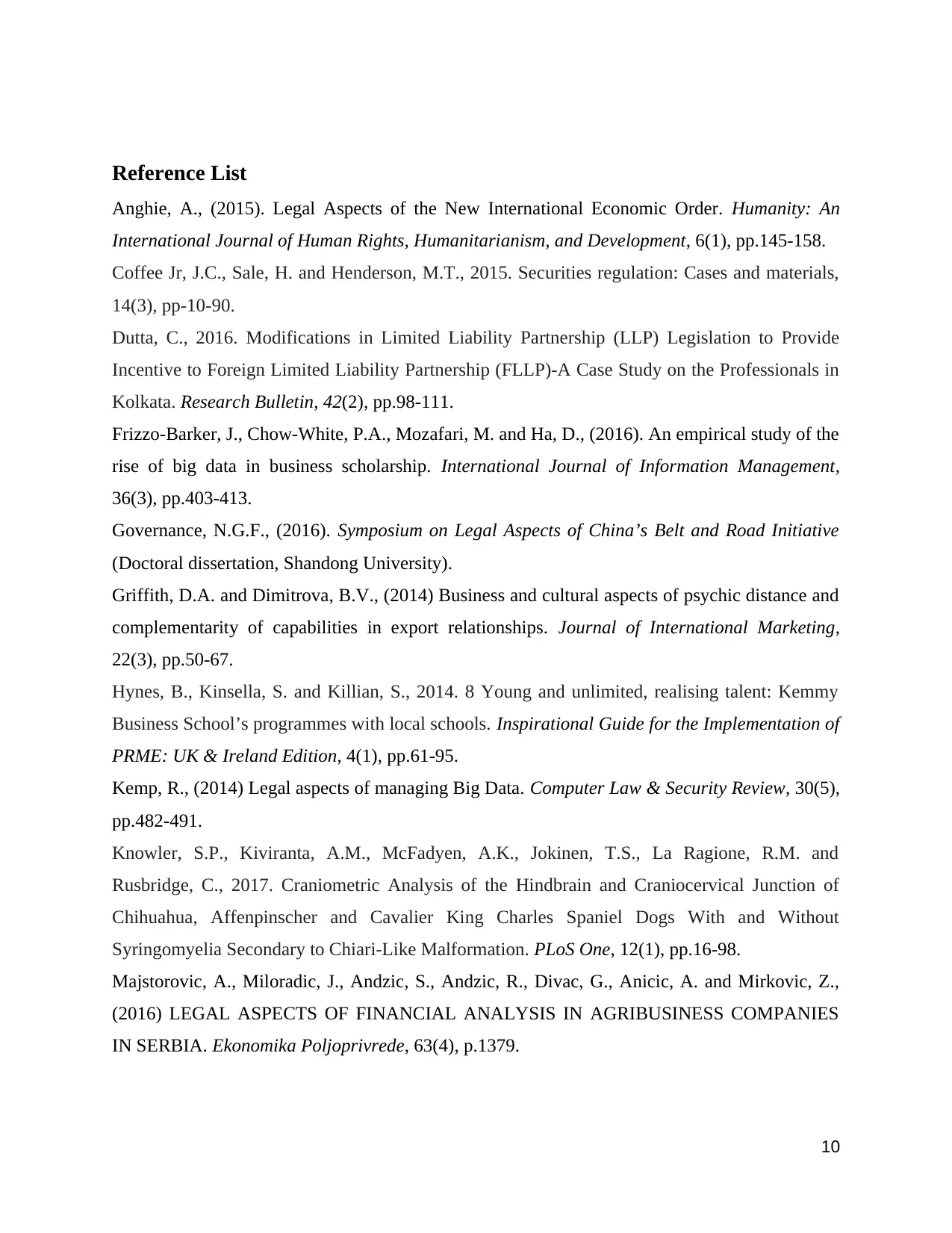
Reference List
Anghie, A., (2015). Legal Aspects of the New International Economic Order. Humanity: An
International Journal of Human Rights, Humanitarianism, and Development, 6(1), pp.145-158.
Coffee Jr, J.C., Sale, H. and Henderson, M.T., 2015. Securities regulation: Cases and materials,
14(3), pp-10-90.
Dutta, C., 2016. Modifications in Limited Liability Partnership (LLP) Legislation to Provide
Incentive to Foreign Limited Liability Partnership (FLLP)-A Case Study on the Professionals in
Kolkata. Research Bulletin, 42(2), pp.98-111.
Frizzo-Barker, J., Chow-White, P.A., Mozafari, M. and Ha, D., (2016). An empirical study of the
rise of big data in business scholarship. International Journal of Information Management,
36(3), pp.403-413.
Governance, N.G.F., (2016). Symposium on Legal Aspects of China’s Belt and Road Initiative
(Doctoral dissertation, Shandong University).
Griffith, D.A. and Dimitrova, B.V., (2014) Business and cultural aspects of psychic distance and
complementarity of capabilities in export relationships. Journal of International Marketing,
22(3), pp.50-67.
Hynes, B., Kinsella, S. and Killian, S., 2014. 8 Young and unlimited, realising talent: Kemmy
Business School’s programmes with local schools. Inspirational Guide for the Implementation of
PRME: UK & Ireland Edition, 4(1), pp.61-95.
Kemp, R., (2014) Legal aspects of managing Big Data. Computer Law & Security Review, 30(5),
pp.482-491.
Knowler, S.P., Kiviranta, A.M., McFadyen, A.K., Jokinen, T.S., La Ragione, R.M. and
Rusbridge, C., 2017. Craniometric Analysis of the Hindbrain and Craniocervical Junction of
Chihuahua, Affenpinscher and Cavalier King Charles Spaniel Dogs With and Without
Syringomyelia Secondary to Chiari-Like Malformation. PLoS One, 12(1), pp.16-98.
Majstorovic, A., Miloradic, J., Andzic, S., Andzic, R., Divac, G., Anicic, A. and Mirkovic, Z.,
(2016) LEGAL ASPECTS OF FINANCIAL ANALYSIS IN AGRIBUSINESS COMPANIES
IN SERBIA. Ekonomika Poljoprivrede, 63(4), p.1379.
10
Anghie, A., (2015). Legal Aspects of the New International Economic Order. Humanity: An
International Journal of Human Rights, Humanitarianism, and Development, 6(1), pp.145-158.
Coffee Jr, J.C., Sale, H. and Henderson, M.T., 2015. Securities regulation: Cases and materials,
14(3), pp-10-90.
Dutta, C., 2016. Modifications in Limited Liability Partnership (LLP) Legislation to Provide
Incentive to Foreign Limited Liability Partnership (FLLP)-A Case Study on the Professionals in
Kolkata. Research Bulletin, 42(2), pp.98-111.
Frizzo-Barker, J., Chow-White, P.A., Mozafari, M. and Ha, D., (2016). An empirical study of the
rise of big data in business scholarship. International Journal of Information Management,
36(3), pp.403-413.
Governance, N.G.F., (2016). Symposium on Legal Aspects of China’s Belt and Road Initiative
(Doctoral dissertation, Shandong University).
Griffith, D.A. and Dimitrova, B.V., (2014) Business and cultural aspects of psychic distance and
complementarity of capabilities in export relationships. Journal of International Marketing,
22(3), pp.50-67.
Hynes, B., Kinsella, S. and Killian, S., 2014. 8 Young and unlimited, realising talent: Kemmy
Business School’s programmes with local schools. Inspirational Guide for the Implementation of
PRME: UK & Ireland Edition, 4(1), pp.61-95.
Kemp, R., (2014) Legal aspects of managing Big Data. Computer Law & Security Review, 30(5),
pp.482-491.
Knowler, S.P., Kiviranta, A.M., McFadyen, A.K., Jokinen, T.S., La Ragione, R.M. and
Rusbridge, C., 2017. Craniometric Analysis of the Hindbrain and Craniocervical Junction of
Chihuahua, Affenpinscher and Cavalier King Charles Spaniel Dogs With and Without
Syringomyelia Secondary to Chiari-Like Malformation. PLoS One, 12(1), pp.16-98.
Majstorovic, A., Miloradic, J., Andzic, S., Andzic, R., Divac, G., Anicic, A. and Mirkovic, Z.,
(2016) LEGAL ASPECTS OF FINANCIAL ANALYSIS IN AGRIBUSINESS COMPANIES
IN SERBIA. Ekonomika Poljoprivrede, 63(4), p.1379.
10
Paraphrase This Document
Need a fresh take? Get an instant paraphrase of this document with our AI Paraphraser
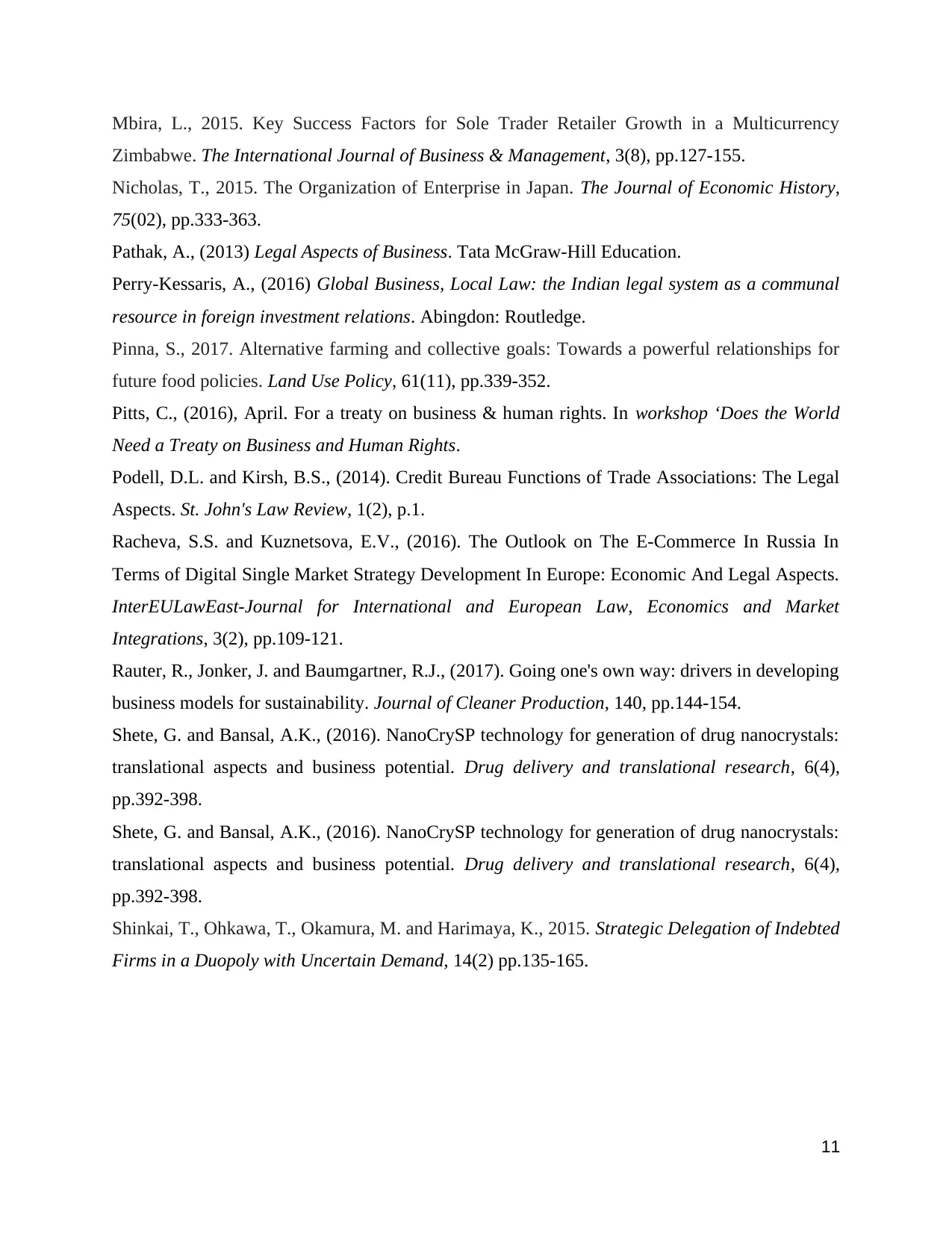
Mbira, L., 2015. Key Success Factors for Sole Trader Retailer Growth in a Multicurrency
Zimbabwe. The International Journal of Business & Management, 3(8), pp.127-155.
Nicholas, T., 2015. The Organization of Enterprise in Japan. The Journal of Economic History,
75(02), pp.333-363.
Pathak, A., (2013) Legal Aspects of Business. Tata McGraw-Hill Education.
Perry-Kessaris, A., (2016) Global Business, Local Law: the Indian legal system as a communal
resource in foreign investment relations. Abingdon: Routledge.
Pinna, S., 2017. Alternative farming and collective goals: Towards a powerful relationships for
future food policies. Land Use Policy, 61(11), pp.339-352.
Pitts, C., (2016), April. For a treaty on business & human rights. In workshop ‘Does the World
Need a Treaty on Business and Human Rights.
Podell, D.L. and Kirsh, B.S., (2014). Credit Bureau Functions of Trade Associations: The Legal
Aspects. St. John's Law Review, 1(2), p.1.
Racheva, S.S. and Kuznetsova, E.V., (2016). The Outlook on The E-Commerce In Russia In
Terms of Digital Single Market Strategy Development In Europe: Economic And Legal Aspects.
InterEULawEast-Journal for International and European Law, Economics and Market
Integrations, 3(2), pp.109-121.
Rauter, R., Jonker, J. and Baumgartner, R.J., (2017). Going one's own way: drivers in developing
business models for sustainability. Journal of Cleaner Production, 140, pp.144-154.
Shete, G. and Bansal, A.K., (2016). NanoCrySP technology for generation of drug nanocrystals:
translational aspects and business potential. Drug delivery and translational research, 6(4),
pp.392-398.
Shete, G. and Bansal, A.K., (2016). NanoCrySP technology for generation of drug nanocrystals:
translational aspects and business potential. Drug delivery and translational research, 6(4),
pp.392-398.
Shinkai, T., Ohkawa, T., Okamura, M. and Harimaya, K., 2015. Strategic Delegation of Indebted
Firms in a Duopoly with Uncertain Demand, 14(2) pp.135-165.
11
Zimbabwe. The International Journal of Business & Management, 3(8), pp.127-155.
Nicholas, T., 2015. The Organization of Enterprise in Japan. The Journal of Economic History,
75(02), pp.333-363.
Pathak, A., (2013) Legal Aspects of Business. Tata McGraw-Hill Education.
Perry-Kessaris, A., (2016) Global Business, Local Law: the Indian legal system as a communal
resource in foreign investment relations. Abingdon: Routledge.
Pinna, S., 2017. Alternative farming and collective goals: Towards a powerful relationships for
future food policies. Land Use Policy, 61(11), pp.339-352.
Pitts, C., (2016), April. For a treaty on business & human rights. In workshop ‘Does the World
Need a Treaty on Business and Human Rights.
Podell, D.L. and Kirsh, B.S., (2014). Credit Bureau Functions of Trade Associations: The Legal
Aspects. St. John's Law Review, 1(2), p.1.
Racheva, S.S. and Kuznetsova, E.V., (2016). The Outlook on The E-Commerce In Russia In
Terms of Digital Single Market Strategy Development In Europe: Economic And Legal Aspects.
InterEULawEast-Journal for International and European Law, Economics and Market
Integrations, 3(2), pp.109-121.
Rauter, R., Jonker, J. and Baumgartner, R.J., (2017). Going one's own way: drivers in developing
business models for sustainability. Journal of Cleaner Production, 140, pp.144-154.
Shete, G. and Bansal, A.K., (2016). NanoCrySP technology for generation of drug nanocrystals:
translational aspects and business potential. Drug delivery and translational research, 6(4),
pp.392-398.
Shete, G. and Bansal, A.K., (2016). NanoCrySP technology for generation of drug nanocrystals:
translational aspects and business potential. Drug delivery and translational research, 6(4),
pp.392-398.
Shinkai, T., Ohkawa, T., Okamura, M. and Harimaya, K., 2015. Strategic Delegation of Indebted
Firms in a Duopoly with Uncertain Demand, 14(2) pp.135-165.
11
1 out of 11
Related Documents
Your All-in-One AI-Powered Toolkit for Academic Success.
+13062052269
info@desklib.com
Available 24*7 on WhatsApp / Email
![[object Object]](/_next/static/media/star-bottom.7253800d.svg)
Unlock your academic potential
Copyright © 2020–2025 A2Z Services. All Rights Reserved. Developed and managed by ZUCOL.




